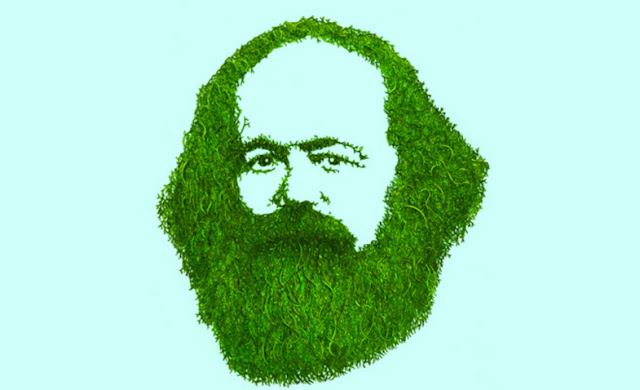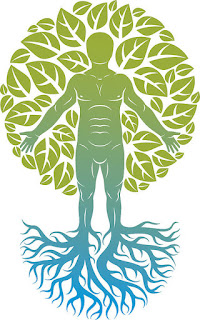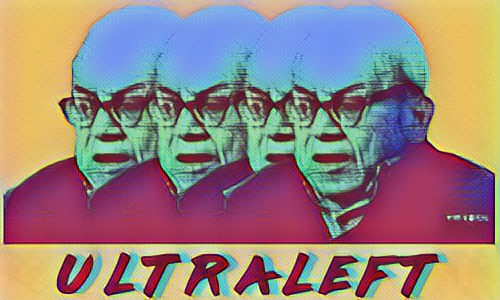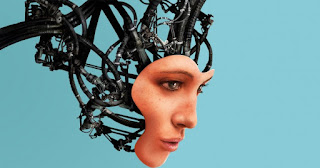New Humanity’s Experimental Utopias, Part II
Marx and Burke: New Humanity
New Humanity is a utopian concept that involves the creation of a new ideal human being or citizen. The meaning of a New Humanity has widely varied and various alternatives have been suggested by a variety of religions and political ideologies, including Christianity, communism, and conservatism.
Marx and New Humanity
Marxism postulates the development of a New Humanity in a communist society following the values of a non-essential nature of the state and the importance of freely associated work for the affirmation of a person's humanity. Marxism does not see the New Humanity as a goal or prerequisite for achieving full communism, but rather as a product of the social conditions of pure communism which is a stateless classless society.
Marx wrote of a ‘dictatorship of the proletariat’ but his class analysis was truly bottom up in organization. In order to critique Marx we must question his strategy of destroying the state via the state by infusing Burke’s advocacy for the “little platoons” of civil society such as localities, autonomous communities, and civic associations. Marxist class analysis is expanded to include a wider array of the oppressed much like intersectional social analysis has expanded inclusion to those oppressions based on race, gender, sexual orientation, ability, etc. For a deeper meaning of class struggle we must expand Marxist class analysis to nonhumans in order to reach an ecocommunism. This is a New Humanity that rejuvenates a New Earth.
For New Humanity to truly transcend theism and its various upgrades would be equivalent to achieving ecological awareness in social, psychic, and philosophical space. Marx argues that communism begins in atheism. Thereby subverting theistic thought modes would necessarily include nonhuman beings in the march toward communism. Doing so would be tantamount to abolishing at least one gigantic chunk of private property: nonhuman beings as slaves and food for humans. Anarchism helps debug communist theory of lingering theisms. The early socialist and leftist theories of the French Revolution allowed later thinkers to seize upon anarchism, and with the publication of Marx and Engel’s Communist Manifesto later in the 19th century there were some who saw the liberation of the working class not in terms of state control, but radical individualism and communitarian democracy.
Marx wrote that “a spectre is haunting… the spectre of communism”... thus communist thought needs to embrace the spectral and figure out exactly what comprises it: not spirits in a divine realm. It is a convocation of spectres that will aid us in imagining something like ecocommunism, a communism of humans and nonhumans alike. The more we think of ecological beings- a human, a tree, an ecosystem, a cloud- the more we find ourselves obliged to think of them not as alive or dead, but spectral. For Marx, the level of analysis is human economic relations. But ecological relations subtend human relations of all kinds and ecological relations extend them throughout the biosphere. This is the mode by which Marxism embraces an ecological class analysis.
Burke and New Humanity
Without cultural and historical continuity, Burke warned, no New Humanity could ever emerge. After all, how could any one generation or even several generations tell a human what was good and what was ill? If not in conversation with the past as well as with the future, how could the present anchor itself to anything beyond the ephemeral? This is the grounding for Burke’s social contract.
Burke proposed “the hereditary principle” as protecting important institutions from pillage or decay, and believed that people have a natural tendency to accept the limits that this principle places on their conduct. Burke’s conservatism has emphasized the importance of small associations, autonomous institutions and the various trusts and colleges that lie beyond reach of the state.
Burke in considering the insolence of the French Revolutionaries rejected the old socialist view that things must be changed from the top downwards, and that the people are not to be trusted now but only later when the revolutionary vanguard has completed its task. The difference is between the “mass movement”’ and Burke’s “little platoon.” In his criticism of the mass movement politics of the French Revolution, Burke repudiated what he saw as a false vision of social order- one in which people are conscripted by an “armed doctrine” in pursuit of a common goal inspired by a central power. Against this he advocated a society of free association at the local level. Burke is arguing that movements destroy social institutions, little platoons preserve it. The conservative will say the same is true of the environment.
This is an effort to reclaim conservatism for those who would rather conserve than destroy the environment. The conservative tradition of Edmund Burke has two guiding principles for political and social change: 1) change must be evaluated in terms of whether it contributes to the further wellbeing of the community; 2) decisions about what needs to be conserved, renewed through modifications or rejected need to be based on the partnership between those who are living, those who are dead and those who are to be born. One can easily read in Burke’s words the Brundtland Commission’s prescription for sustainable development, that is development that meets the needs of the present without harming future generations ability to meet their needs.
Environmentalists can call themselves conservatives because of what they stand for which is to conserve the life supporting characteristics of natural systems as well as cultural traditions that contribute to long term sustainability. The task is the recovery of a philosophical conservatism deeply consistent with environmental protection- such as the “precautionary principle.” This eco-conservatism begins perhaps in Western thought with Wordsworth, or the French biophysical economists the physiocrats, is influenced by Gandhi and First Nations philosophies, and taught by Schumacher in Small is Beautiful.
Understanding the need for some wisdom to be gleaned and understood over time, Burke claimed, the sagacious among us—had engaged in not only a conversation, but, more importantly, a contract of all men, from Adam to the Omega. While one might call it a contract of sorts, it is really a partnership that crosses all of time. It is to be looked on with reverence because it is not a partnership in things subservient only to the gross animal existence of a temporary and perishable nature. It is a partnership in all science, a partnership in all art, a partnership in every virtue, and in all perfection. As the ends of such a partnership cannot be obtained in many generations, it becomes a partnership not only among those who are living, but among those who are living, those who are dead, and those who are to be born.
In reverence to the New Earth, Burke’s social contract is extended beyond the living and the nonliving to include also the nonhuman. Christianity is the great equalizer. Not only is it the first force in the world to recognize the moral equality of all New Humanity—past, present, and future—but it calls for a New Earth in which New Humanity is called to extend the circle of renewal to all life and life sustaining nature.
Finally, Burke writes that no religion understood the necessity and goodness of free will as much as Christianity. In the desire for the well-ordered society, New Humanity knows that many decisions must remain guesses and that true order comes from the justice of choice and dignity. “It is better to cherish virtue and humanity, by leaving much to free will, even with some loss to the object,” Burke convincingly wrote, “than to attempt to make men mere machines and instruments of a political benevolence. The world on the whole will gain by a liberty, without which virtue cannot exist.” This philosophical conservatism attempts to discover the order that inheres in things rather than impose order on things. Edmund Burke argues that “change must come from within the community, not be imposed from without.” This is an argument regarding the role of the state.
Experimentation with Utopias
In order to understand the state’s role, we have to define what a state is. Both Burke and Marx have criticised attempts to conceive of the state as analogous to civil society. Marx highlighted this separation, stating that the “political state everywhere needs the guarantee of spheres lying outside it.”
The state is therefore, according to Marx and Burke, a separate entity to civil society: “no organicist metaphor, no irrelevant bromide that ‘we are all part of one another,’ must be permitted to obscure this basic [that we as a collective are not the state].” What distinguishes the state from other institutions of civil society is its attempts to maintain itself as the sole association of individuals holding the ‘right’ to use coercive violence over a given geographical area. Marx also recognised the state’s basis in coercive violence. However, “the most prevalent conception of the state within Marxist theory” is that of instrumentalism: the state being defined as “an instrument in the hands of the ruling class for enforcing and guaranteeing the stability of the class structure itself.”
The state is both an originator of and catalyst for oppression. It has, in various forms, supported harmful power structures within society, from racism and speciesism to patriarchy and ageism. It is responsible for war and empire. Its restrictions on freedom of trade and freedom of movement have drastically slowed humanity’s ascent out of poverty. These evils and more are, in the view of anarcho-communists, avoidable; hence, the state must have no role. That is to say, the state must be abolished.
In Burke’s first work Vindication of Natural Society, he advances an anarchist argument. He writes that the state is responsible for war and estimates that, from ancient times, thirty-six million people have been slaughtered by governments. Burke points to the familiar fact that governments do things "for reasons of state" which individuals could not justly do. But he adds that these injustices are grounded on the very nature of the State itself, on the fact that the State is necessarily supported by coercive violence.
Burke wittily deduces that Hobbes' appalling view of humanity in the state of nature was derived, not from Hobbes' observations of ordinary human action, but from his study of the actions of humanity when banded together into states. Burke's attack is levelled not against society – the framework of peaceful human interrelations and exchanges, but against States – those uniquely coercive elements in human relations. His argument rests on a belief that when we observe the nature of humans, we find that States are anti-social institutions. William Godwin, the late eighteenth-century English founder of communist anarchism, hailed Burke’s Vindication as a precursor of his own viewpoint.
It must be stressed that, in the final analysis, Marx also believed that the state should eventually have no role. However, the means advocated by Marx to achieve this are flawed, according to anarchist criticism. His proposition that the proletariat should establish a ‘dictatorship’ in order to create a classless society has empirically led to state tyranny and oppression on an unprecedented scale.
Admittedly, there are elements of non-governmental routes to the destruction of the state in Marx’s writings. His advocacy of “municipal committees and municipal councils…worker’s clubs or worker’s committees” hints at worker self-organization rather than the statist means to the creation of the stateless society. However, the overriding narrative is one of ‘statelessness via the state.’
We have seen how anarcho-communist thought and Marx’s thought differ with regards to both the current role of the state and what role the state should have. Whilst Marx conceived of the state as an instrument of one ruling class, anarcho-communists highlight the importance of the intersecting structures of oppression of the state. Although both Marx and anarcho-communists eventually envision the dissolution of the state, they profoundly disagree on the means by which to bring this about. According to anarcho-communists, Marx’s strategy of using the state as a tool to abolish itself will merely create and then perpetuate dictatorship in a new form. Looking at the historical record, this criticism appears all too valid.
With the combination of Burke with Marx, ecocommunism provides the dual power strategy used to undermine the state by means of many autonomous communities, localities, and civil associations. Burke’s “little platoon’s” meets Marx’s bottom up “proletariat revolution” equals pockets of ecocommunism persisting in opposition to the state in transition to a stateless classless society. The state does not subsume civil society and as such will wither away by way of the advancement of alternative horizontal structures. This Burkean-Marxist milieu is effectively ecologized by the expansion of Marxian class analysis and Burkean social contract theory. The revolution must be bottom-up and grounded in eco-conservation in order to build an ecological stateless classless society in the shell of the old.







Comments
Post a Comment